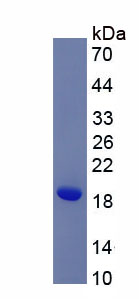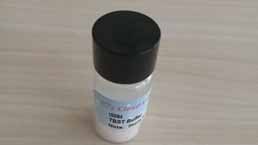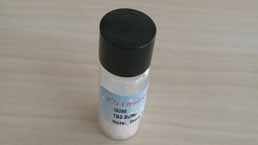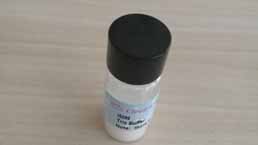Active Histone H3 (H3)
- Product No.APA285Hu01
- Organism SpeciesHomo sapiens (Human) Same name, Different species.
- Buffer FormulationPBS, pH7.4, containing 0.01% SKL, 5% Trehalose.
- Traits Freeze-dried powder
- Purity> 90%
- Isoelectric Point11.7
- ApplicationsCell culture; Activity Assays.
- DownloadInstruction Manual
- UOM 10µg50µg 200µg 1mg 5mg
- FOB
US$ 212
US$ 530
US$ 1060
US$ 3180
US$ 7950
For more details, please contact local distributors!
ACTIVITY TEST
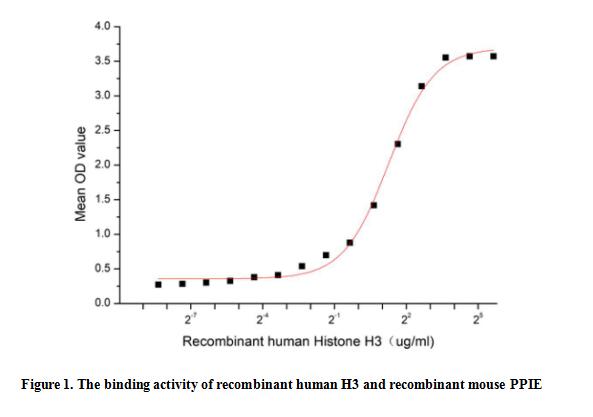
Histone H3 is one of the five main histone proteins involved in the structure of chromatin in eukaryotic cells. H3 is highly conserved across species, indicating its critical role in chromatin structure and function. It is subject to various post-translational modifications, including acetylation, methylation, phosphorylation, and ubiquitination, which can affect gene expression by altering chromatin structure and recruiting regulatory proteins. These modifications are key components of epigenetic mechanisms that regulate gene activity without altering the underlying DNA sequence. Besides, Peptidylprolyl Isomerase E (PPIE) has been identified as an interactor of H3, thus a functional binding ELISA assay was conducted to detect the interaction of recombinant human H3 and recombinant mouse PPIE. Briefly, H3 was diluted serially in PBS with 0.01% BSA (pH 7.4). Duplicate samples of 100 μl were then transferred to PPIE-coated microtiter wells and incubated for 1h at 37℃. Wells were washed with PBST and incubated for 1h with anti-H3 pAb, then aspirated and washed 3 times. After incubation with HRP labelled secondary antibody for 1h at 37℃, wells were aspirated and washed 5 times. With the addition of substrate solution, wells were incubated 15-25 minutes at 37℃. Finally, add 50 µL stop solution to the wells and read at 450/630 nm immediately. The binding activity of recombinant human H3 and recombinant mouse PPIE was shown in Figure 1, the EC50 for this effect is 2.40 ug/mL.
USAGE
Reconstitute in 10mM PBS (pH7.4) to a concentration of 0.1-1.0 mg/mL. Do not vortex.
STORAGE
Avoid repeated freeze/thaw cycles. Store at 2-8°C for one month. Aliquot and store at -80°C for 12 months.
STABILITY
The thermal stability is described by the loss rate. The loss rate was determined by accelerated thermal degradation test, that is, incubate the protein at 37°C for 48h, and no obvious degradation and precipitation were observed. The loss rate is less than 5% within the expiration date under appropriate storage condition.
GIVEAWAYS
INCREMENT SERVICES
| Magazine | Citations |
| Biomed Res Int | A Novel Anti-Histone H1 Monoclonal Antibody, SSV Monoclonal Antibody, Improves Lung Injury and Survival in a Mouse Model of Lipopolysaccharide-Induced Sepsis-Like Syndrome PubMed: 25649890 |
| Cell Death & Disease | Proteomic analysis reveals USP7 as a novel regulator of palmitic acid-induced hepatocellular carcinoma cell death Pubmed:35732625 |
| Catalog No. | Related products for research use of Homo sapiens (Human) Organism species | Applications (RESEARCH USE ONLY!) |
| APA285Hu01 | Active Histone H3 (H3) | Cell culture; Activity Assays. |
| RPA285Hu01 | Recombinant Histone H3 (H3) | Positive Control; Immunogen; SDS-PAGE; WB. |
| CAA285Hu01 | Anti-Histone H3 (H3) Polyclonal Antibody | Loading Control of WB. |
| PAA285Hu01 | Polyclonal Antibody to Histone H3 (H3) | WB; IHC; ICC; IP. |
| CAA285Hu22 | Anti-Histone H3 (H3) Monoclonal Antibody | Loading Control of WB. |
| KSA285Hu01 | ELISA Kit DIY Materials for Histone H3 (H3) | Main materials for "Do It (ELISA Kit) Yourself". |


